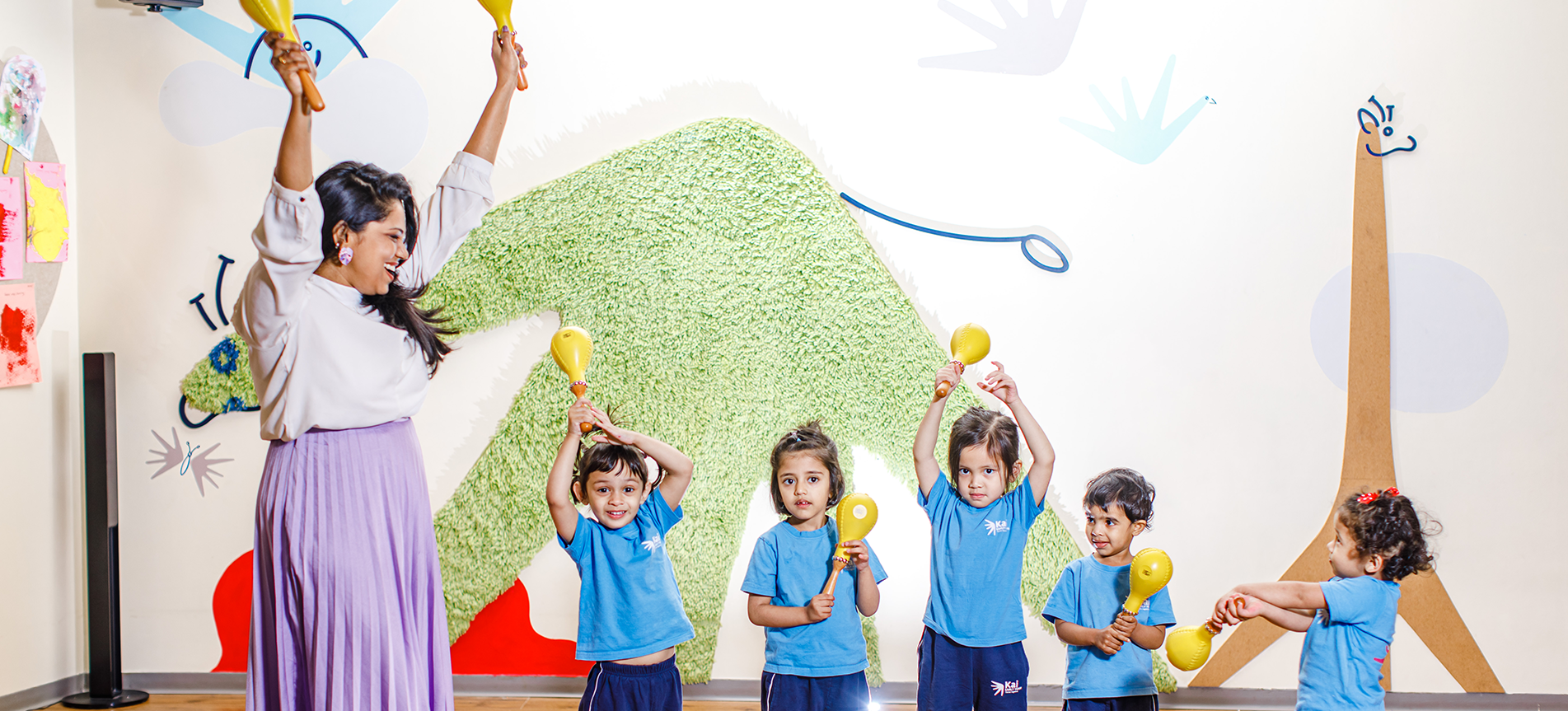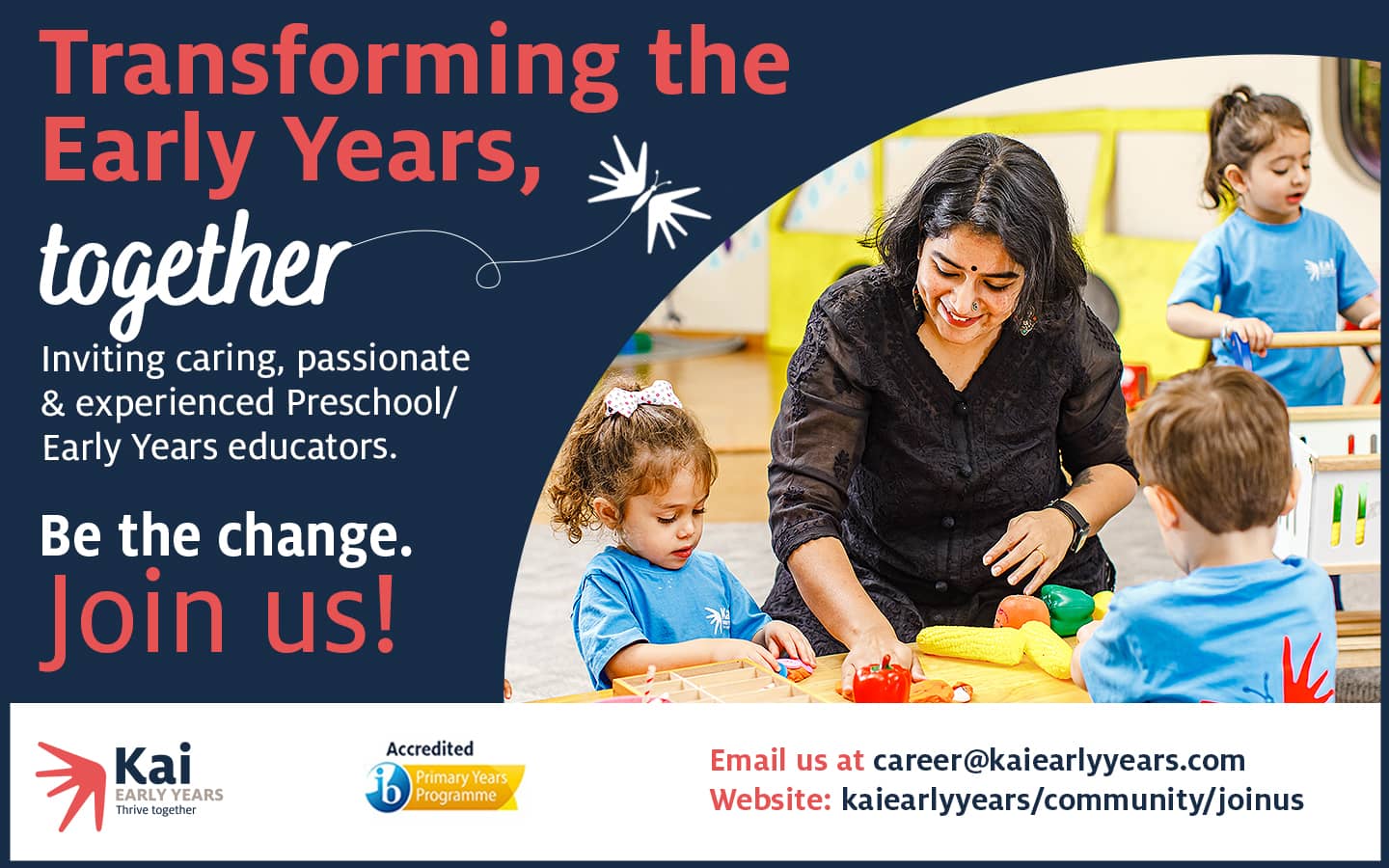Toddler: Ages 2 – 3 years
Timings: 8:00 am – 12:00 pm (Mondays – Fridays) || Teachers to Students Ratio: 1 : 8
Introduction
In the Toddler year at Kai, curiosity blooms and every day is a new adventure. Children begin to find their voice, express their needs, and take brave steps toward independence. This is a phase filled with movement, emotion, wonder — and questions. At this age, learning is active and sensory-rich. Our spaces are designed to offer structure through routine, yet the freedom to explore, imitate, and play remains at the heart of the experience.
Children begin to participate in group routines, care for themselves with support, and connect with peers. Growing independence is gently encouraged through everyday tasks — including early self-care routines like handwashing, dressing, and toilet training. Our thoughtfully designed restrooms support this stage with child-friendly features that help toddlers feel secure and capable as they develop new skills.
Our educators nurture this growth with empathy and patience, helping toddlers understand and manage their emotions, practice making choices, and build trust with the adults around them. It’s not just about what toddlers learn, but how they begin to feel as learners — confident, seen, and capable.
The IB Units of Inquiry
In the Toddler program, inquiry is gently introduced through lived experiences and playful encounters. The Units of Inquiry (Themes) provide a flexible, age-appropriate framework that helps children explore the world through their senses, stories, movement, and discovery. In “Exploring Through Our Senses,” children learn how they see, smell, hear, taste, and touch the world around them. In “Rhymes and Songs,” they discover rhythm, voice, and cultural expression through music and repetition. “Transport and Movement” sparks fascination with how things go and where they take us. And in “Caring for Living Things,” toddlers begin to recognize that plants, animals, and people have needs too. These learning experiences are supported by the varied 20 indoor and outdoor environments, including the garden, sandpit, fruit trees, hidden cave and amphitheatre.
These experiences nurture essential attributes of the IB Learner Profile — children begin to develop as Thinkers through hands-on problem-solving, Caring individuals through small acts of kindness, and Knowledgeable learners by moving, resting, exploring, and connecting. Montessori practices are deeply embedded in daily life — toddlers pour, sort, wash, scoop, and build, developing fine motor control and concentration. These foundational experiences aren’t academic in nature — they are about building the skills, habits, and confidence to inquire, express, and grow in meaningful ways. Montessori time is one of many opportunities throughout the day to interact with mixed age groups.
Physical Development
Toddlers build strength and coordination through climbing, running, dancing, and gross motor games. Fine-motor skills grow through hands-on activities such as stacking blocks, pouring grains, threading beads, and beginning to use simple tools. These experiences help children gain body awareness, balance, and increasing control over their movements.
Numeracy
Early thinking skills are developed through matching, sorting, and sequencing games. Children begin to notice patterns, make simple choices, and explore cause and effect through exploration. They begin to categorize by shape, size, color, and purpose — all essential cognitive foundations for later academic learning.
Language Development
This is a time of rapid language growth. Through songs, rhymes, storytelling, exploration and guided conversations, toddlers expand their vocabulary and begin using two- and three-word phrases to express their needs and thoughts. Language development is supported visually and physically — through gestures, expressions, materials and responsive interaction. For children exposed to multiple languages, our environment supports both clarity and connection through rich, repeated, and purposeful language use.
Social & Emotional Development
At this age, emotions are big — and often difficult to manage. Our teachers guide toddlers to identify and name their feelings, recognize emotions in others, and begin using simple strategies to self-regulate. Social development is gently encouraged through group play, sharing routines, and opportunities to take turns. With a consistent, responsive environment, toddlers feel safe, understood, and more willing to try new experiences. By interacting with older peers, they begin to understand norms and social interactions.
Creative Development
Toddlers explore materials freely through music, movement, art, and pretend play. They begin to imitate the world around them — pretending to cook, drive, or care for a baby. These experiences build imagination and offer outlets for self-expression. Creative activities at this stage are less about finished products and more about joy, exploration, and communication.
Approaches to Learning
Children in the Toddler program are encouraged to make choices, explore new materials, and build confidence through trial and error. They begin to persist through small challenges, take initiative in everyday tasks, and feel pride in doing something “by myself.” These learning dispositions — curiosity, initiative, and joy — are the earliest foundations of inquiry. In this way, learning at Kai starts not with worksheets or memorization, but with a spark: “I wonder…”
“As parents, we are grateful to the teachers, administrators, and support staff for creating an environment where our children feel comfortable and secure. They can grow, learn, and attend school each day with joy, returning home with smiles. Thank you for fostering such a nurturing and enriching space for our children at Kai Early Years.“
– Heidi Depner (Toddler Parent)
Your child’s day at Kai

